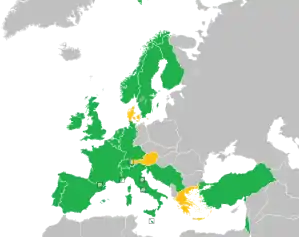Eurovision Song Contest 1975
The Eurovision Song Contest 1975 was the 20th edition of the annual Eurovision Song Contest. It took place in Stockholm, Sweden, following ABBA's win at the 1974 contest in Brighton, United Kingdom with the song "Waterloo". It was the first time the contest took place in Sweden, also marking the first time the Scandinavian Peninsula hosted the event. The contest was held at Stockholmsmässan on Saturday, 22 March 1975. The show was hosted by Karin Falck.
| Eurovision Song Contest 1975 | |
|---|---|
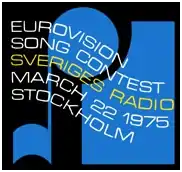 | |
| Dates | |
| Grand final | 22 March 1975 |
| Host | |
| Venue | Stockholmsmässan Stockholm, Sweden |
| Presenter(s) | Karin Falck |
| Musical director | Mats Olsson |
| Directed by | Bo Billtén |
| Executive supervisor | Clifford Brown |
| Executive producer | Roland Eiworth |
| Host broadcaster | Sveriges Radio (SR) |
| Interval act | The World of John Bauer |
| Website | eurovision |
| Participants | |
| Number of entries | 19 |
| Debuting countries | |
| Returning countries | |
| Non-returning countries | |
Participation map
| |
| Vote | |
| Voting system | Each country awarded 12, 10, 8-1 points to their 10 favourite songs |
| Nul points | None |
| Winning song | "Ding-a-dong" |
Nineteen countries participated in the contest, beating the previous record of eighteen, that was first set in the 1965 edition. France and Malta returned after their one-year and two-year absence, respectively. Turkey made its debut, while Greece decided not to enter after its debut the year prior.[1]
The winner was the Netherlands with the song "Ding-a-dong", performed by Teach-In, written by Will Luikinga and Eddy Ouwens, and composed by Dick Bakker. This was the Netherlands' fourth victory in the contest, following their wins in 1957, 1959, and 1969.[1] It would be another 44 years before the Netherlands' next win.[2]
Location
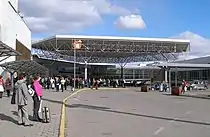
The contest took place in Stockholm, the capital and largest city of Sweden, which has long been one of the country's cultural, media, political, and economic centres as well as the most populated urban area in Scandinavia.[3][4]
The venue for the contest was Stockholmsmässan (or Stockholm International Fairs in English). The main building is in Älvsjö – a southern suburb of Stockholm Municipality for which the building got its nickname. It was constructed in 1971 and holds 4,000 people.
Format
This year a new scoring system was implemented. Each country would be represented by a jury of 11 members, at least half of whom had to be under the age of 26. Each jury member had to award every song a mark of between 1 and 5 points, but could not vote for their own nation's entry. The votes were cast immediately after the song was performed and collected by the adjudicator straight away. After the last song was performed, the jury secretary added up all the votes cast and awarded 12 points to the song with the highest score, 10 to the second highest score, then 8 to the third, 7 to the fourth, 6 to the fifth and so forth down to 1 point for the song ranked 10th, a points system that remains in use today. The jury spokesperson then announced the ten scores in the order the songs were presented when called upon by the hostess. The hostess Karin Falck several times confused the new system with questions like "How much is seven in France?"
Unlike today, the points were not given in order (from 1 up to 12), but in the order the songs were performed. The current procedure of announcing the scores in ascending order, beginning with 1 point, was not established until 1980. This scoring system remained in use until 1996, although the number of jurors varied (it was 11 from 1975 to 1987, and 16 from 1988 to 1997) and the scores they awarded each song increased to 10 rather than 5. In from 1997, some juries were replaced by televotes and from 1998, all countries were encouraged to televote when possible.
In the 2009 final and the 2010 semi-finals, the juries were reintroduced to provide 50% of the scores. Despite these changes in how the points were decided, the 'douze points' scoring system remained in place from 1975–2015. In 2016 it was altered to each country providing two separate sets of points, however, modelled after the former model.[5]
Participating countries
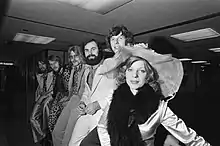
Nineteen countries took part; Greece decided not to enter after its 1974 debut, while Turkey made its debut, and France and Malta returned to the contest.[1]
The Portuguese entry "Madrugada" was an unabashed celebration of the Carnation Revolution, during which the country's 1974 Eurovision entry had played a pivotal practical role. According to author and historian John Kennedy O'Connor in his book The Eurovision Song Contest – The Official History, the Portuguese performer had to be dissuaded from wearing his Portuguese army uniform and carrying a gun onto the stage.[6] Some competitors (notably Portugal and Yugoslavia) opted to perform their songs in English for the rehearsals heard by the judges, but in their native tongue at the final. Others, such as Belgium and Germany, opted for a mix of their own language and English.
Conductors
Each performance had a conductor who conducted the orchestra.[7][8]
 Netherlands – Harry van Hoof
Netherlands – Harry van Hoof Ireland – Colman Pearce
Ireland – Colman Pearce France – Jean Musy
France – Jean Musy Germany – Rainer Pietsch
Germany – Rainer Pietsch Luxembourg – Phil Coulter
Luxembourg – Phil Coulter Norway – Carsten Klouman
Norway – Carsten Klouman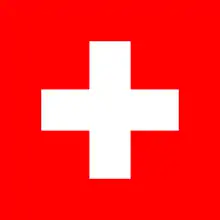 Switzerland – Peter Jacques
Switzerland – Peter Jacques.svg.png.webp) Yugoslavia – Mario Rijavec
Yugoslavia – Mario Rijavec United Kingdom – Alyn Ainsworth
United Kingdom – Alyn Ainsworth Malta – Vince Tempera
Malta – Vince Tempera.svg.png.webp) Belgium – Francis Bay
Belgium – Francis Bay Israel – Eldad Shrem
Israel – Eldad Shrem Turkey – Timur Selçuk
Turkey – Timur Selçuk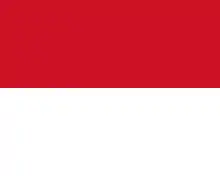 Monaco – André Popp
Monaco – André Popp Finland – Ossi Runne
Finland – Ossi Runne Portugal – Pedro vaz Osório
Portugal – Pedro vaz Osório.svg.png.webp) Spain – Juan Carlos Calderón
Spain – Juan Carlos Calderón Sweden – Lars Samuelson
Sweden – Lars Samuelson Italy – Natale Massara
Italy – Natale Massara
Returning artists
Norway's Ellen Nikolaysen was one of the only two participants to return to the contest this year. Ellen's previous participation was with the band Bendik Singers in 1973. The second was John Farrar, one of The Shadows member who appeared as a backing guitarist and vocalist for Cliff Richard in 1973.[1]
Results
Scoreboard
| Results | |||||||||||||||||||||
|---|---|---|---|---|---|---|---|---|---|---|---|---|---|---|---|---|---|---|---|---|---|
| Netherlands | 152 | 8 | 5 | 8 | 10 | 12 | 6 | 8 | 12 | 12 | 3 | 12 | 4 | 10 | 10 | 7 | 12 | 12 | 1 | ||
| Ireland | 68 | 6 | 6 | 4 | 7 | 1 | 6 | 4 | 12 | 1 | 4 | 3 | 10 | 4 | |||||||
| France | 91 | 8 | 12 | 3 | 8 | 7 | 2 | 7 | 1 | 7 | 12 | 8 | 8 | 8 | |||||||
| Germany | 15 | 8 | 3 | 4 | |||||||||||||||||
| Luxembourg | 84 | 12 | 10 | 3 | 7 | 3 | 5 | 6 | 5 | 5 | 8 | 6 | 4 | 10 | |||||||
| Norway | 11 | 2 | 2 | 7 | |||||||||||||||||
| Switzerland | 77 | 7 | 2 | 10 | 6 | 2 | 1 | 5 | 6 | 8 | 7 | 5 | 4 | 2 | 12 | ||||||
| Yugoslavia | 22 | 3 | 4 | 2 | 5 | 1 | 7 | ||||||||||||||
| United Kingdom | 138 | 4 | 3 | 12 | 10 | 12 | 7 | 8 | 12 | 8 | 10 | 10 | 12 | 7 | 5 | 10 | 5 | 3 | |||
| Malta | 32 | 1 | 8 | 5 | 2 | 4 | 2 | 7 | 1 | 2 | |||||||||||
| Belgium | 17 | 5 | 7 | 3 | 2 | ||||||||||||||||
| Israel | 40 | 10 | 1 | 1 | 1 | 1 | 5 | 2 | 1 | 1 | 6 | 3 | 6 | 2 | |||||||
| Turkey | 3 | 3 | |||||||||||||||||||
| Monaco | 22 | 3 | 4 | 2 | 1 | 2 | 2 | 3 | 5 | ||||||||||||
| Finland | 74 | 5 | 12 | 6 | 10 | 12 | 5 | 4 | 8 | 8 | 1 | 3 | |||||||||
| Portugal | 16 | 2 | 12 | 2 | |||||||||||||||||
| Spain | 53 | 7 | 5 | 3 | 5 | 4 | 4 | 4 | 3 | 4 | 8 | 6 | |||||||||
| Sweden | 72 | 7 | 7 | 8 | 1 | 6 | 7 | 2 | 3 | 8 | 6 | 6 | 6 | 5 | |||||||
| Italy | 115 | 6 | 4 | 4 | 3 | 6 | 10 | 10 | 10 | 10 | 6 | 5 | 10 | 1 | 12 | 10 | 7 | 1 | |||
12 points
Below is a summary of all 12 points in the final:
| N. | Contestant | Voting nation |
|---|---|---|
| 6 | Netherlands | Israel, Malta, Norway, Spain, Sweden, United Kingdom |
| 4 | United Kingdom | France, Luxembourg, Monaco, Yugoslavia |
| 2 | Finland | Germany, Switzerland |
| France | Ireland, Portugal | |
| 1 | Ireland | Belgium |
| Italy | Finland | |
| Luxembourg | Netherlands | |
| Portugal | Turkey | |
| Switzerland | Italy |
Broadcasters, commentators and spokespersons
Spokespersons
Listed below is the order in which votes were cast during the 1975 contest along with the spokesperson who was responsible for announcing the votes for their respective country.
 Netherlands – Dick van Bommel
Netherlands – Dick van Bommel Ireland – Brendan Balfe[11]
Ireland – Brendan Balfe[11] France – Marc Menant
France – Marc Menant Germany – Hans-Joachim Scherbening
Germany – Hans-Joachim Scherbening Luxembourg – TBC
Luxembourg – TBC Norway – Sverre Christophersen[12]
Norway – Sverre Christophersen[12] Switzerland – Michel Stocker[13]
Switzerland – Michel Stocker[13].svg.png.webp) Yugoslavia – Dragana Marković
Yugoslavia – Dragana Marković United Kingdom – Ray Moore[8]
United Kingdom – Ray Moore[8] Malta – TBC
Malta – TBC.svg.png.webp) Belgium – Ward Bogaert
Belgium – Ward Bogaert Israel – Yitzhak Shim'oni[14]
Israel – Yitzhak Shim'oni[14] Turkey – Bülent Osma
Turkey – Bülent Osma Monaco – Carole Chabrier
Monaco – Carole Chabrier Finland – Kaarina Pönniö[15]
Finland – Kaarina Pönniö[15] Portugal – Ana Zanatti
Portugal – Ana Zanatti.svg.png.webp) Spain – José María Íñigo
Spain – José María Íñigo Sweden – Sven Lindahl[16]
Sweden – Sven Lindahl[16] Italy – Anna Maria Gambineri
Italy – Anna Maria Gambineri
Broadcasters and commentators
Each national broadcaster also sent a commentator to the contest, in order to provide coverage of the contest in their own native language.[1]
| Country | Broadcaster(s) | Commentator(s) | Ref(s) | |
|---|---|---|---|---|
| Participating countries | ||||
| RTB | French: Paule Herreman | [11] | ||
| BRT | Dutch: Jan Theys | [11] | ||
| RTB La Première | French: Jacques Bauduin | |||
| BRT Radio 1 | Dutch: Nand Baert | |||
| Yle TV1 | Heikki Seppälä | [11][15] | ||
| Yleisohjelma | Erkki Melakoski | |||
| TF1 | Georges de Caunes | [17][18] | ||
| Deutsches Fernsehen | Werner Veigel | [11][19] | ||
| Deutschlandfunk | Wolf Mittler | |||
| RTÉ | Mike Murphy | [11] | ||
| RTÉ Radio | Liam Devally | |||
| Israeli Television | No commentator | |||
| Rete 1 | Silvio Noto | |||
| RTL Télé Luxembourg | Jacques Navadic | [11][17] | ||
| RTL | Camillo Felgen | |||
| MTV | Norman Hamilton | |||
| Télé Monte Carlo | Georges de Caunes | |||
| Nederland 2 | Willem Duys | [11][20] | ||
| NRK | John Andreassen | [11][12] | ||
| NRK P1 | Erik Heyerdahl | |||
| I Programa | Júlio Isidro | [11][21] | ||
| Emissora Nacional Programa 1 | Amadeu Meireles | |||
| Primera Cadena | José Luis Uribarri | [11][22] | ||
| SR TV1 | Åke Strömmer | [11][16] | ||
| SR P3 | Ursula Richter | [16] | ||
| TV DRS | German: Theodor Haller | |||
| TSR | French: Georges Hardy | [18] | ||
| TSI | Italian: Giovanni Bertini | |||
| RSR 1 | French: Robert Burnier | [23] | ||
| Ankara Television | Bülend Özveren | [11] | ||
| Radyo 1 | Şebnem Savaşçı | |||
| BBC1 | Pete Murray | [11][8][24] | ||
| BBC Radio 2 | Terry Wogan | [8] | ||
| BFBS Radio | Richard Astbury | [8] | ||
| TVB 1 | Serbo-Croatian: Milovan Ilić | |||
| TVZ 1 | Serbo-Croatian: Oliver Mlakar | |||
| TVL 1 | Slovene: Tomaž Terček | |||
| Non-participating countries | ||||
| FS2 | Ernst Grissemann | [11] | ||
| DR TV | Claus Toksvig | |||
| EIRT | Mako Georgiadou | |||
| TBC | Unknown | [25] | ||
| Sjónvarpið | Dóra Hafsteinsdóttir | [8][25][26] | ||
| NHK | Unknown | [8][25] | ||
| JRTV | Unknown | [8][25] | ||
| KBS | Unknown | [8][25] | ||
| Soviet Central Television | Unknown | [8] | ||
Notable incidents
Intelligence reports at the time pointed out the festival as a possible target for a terrorist attack by the Red Army Faction which forced the organizers to tighten security considerably. The attack struck the West German embassy in Stockholm instead about a month later (see West German embassy siege).
The Swedish left movement protested against the contest and its commercial aspect. At first the criticism was directed towards SR for the huge amount of money they spent on the contest but soon the protests developed into a movement against commercial music overall. When the Eurovision Song Contest took place an alternative festival was organized in another part of Stockholm where anybody who wanted could perform a song. Most popular became Sillstryparn's entry "Doing the omoralisk schlagerfestival" (Doing the immoral Eurovision festival). In the autumn of 1975 SR informed that Sweden would not participate in the 1976 edition of the Eurovision Song Contest due to the high costs that came with hosting the show. The rules later changed so that the costs were split more equally between the participating broadcasters. In the end, SR did not broadcast the 1976 Contest.
Swedish TV technicians refused to broadcast the festival to Chile, where Televisión Nacional de Chile (an old associate member of the EBU) had plans to air it. The refusal was in protest to the military dictatorship that has been ruling the country since the 1973 Chilean coup d'etat led by Augusto Pinochet.[27]
References
- "Eurovision Song Contest 1975". European Broadcasting Union. Retrieved 10 July 2012.
- Eurovision Song Contest 2019
- "Tätorter 2010" (PDF) (in Northern Sami). Statistics Sweden. Archived from the original (PDF) on 16 June 2011. Retrieved 16 June 2011.
- "Byopgørelsen 1. januar 2010" (PDF). Retrieved 3 June 2011.
- Dahlander, Gustav. "SVT bakom historisk förändring inför Eurovision Song Contest i Stockholm 2016".
- O'Connor, John Kennedy. The Eurovision Song Contest – The Official History. Carlton Books, UK. 2007 ISBN 978-1-84442-994-3
- "And the conductor is..." Retrieved 3 August 2020.
- Roxburgh, Gordon (2014). Songs for Europe: The United Kingdom at the Eurovision Song Contest. Volume Two: The 1970s. Prestatyn: Telos Publishing. pp. 180–194. ISBN 978-1-84583-093-9.
- "Eurovision Song Contest 1975". The Diggiloo Thrush. Retrieved 4 March 2012.
- "Eurovision Song Contest 1975". 4Lyrics.eu. Retrieved 16 September 2020.
- "Eurovision 1975 - Cast and Crew". IMDb. Retrieved 3 August 2020.
- Dyrseth, Seppo (OGAE Norway)
- Baumann, Peter Ramón (OGAE Switzerland)
- "פורום אירוויזיון". Sf.tapuz.co.il. 13 September 1999. Archived from the original on 8 October 2011. Retrieved 10 August 2012.
- "Selostajat ja taustalaulajat läpi vuosien? • Viisukuppila". Viisukuppila.fi. Retrieved 10 August 2012.
- "Infosajten.com". Infosajten.com. Archived from the original on 18 July 2012. Retrieved 10 August 2012.
- Christian Masson. "1975 – Stockholm". Songcontest.free.fr. Retrieved 10 August 2012.
- "Au Grand Prix Eurovision de la Chanson". Radio TV - Je vois tout. Lausanne, Switzerland: Le Radio SA. 20 March 1975.
- "Eurovision Song Contest 1975". Ecgermany.de. Retrieved 10 August 2012.
- "Nederlandse televisiecommentatoren bij het Eurovisie Songfestival". Eurovision Artists (in Dutch).
- "Comentadores Do ESC – escportugalforum.pt.vu | o forum eurovisivo português". 21595.activeboard.com. Archived from the original on 21 April 2012. Retrieved 10 August 2012.
- "FORO FESTIVAL DE EUROVISIÓN • Ver Tema – Uribarri comentarista Eurovision 2010". Eurosongcontest.phpbb3.es. Archived from the original on 17 March 2012. Retrieved 10 August 2012.
- "Au Grand Prix Eurovision de la Chanson". Radio TV - Je vois tout. Lausanne, Switzerland: Le Radio SA. 20 March 1975.
- "Grand Final: 1975, Eurovision Song Contest". BBC.
- "Recalling Sweden's first staging of the contest in 1975". Eurovision Song Contest. 22 March 2013. Retrieved 13 August 2020.
- Háskólabókasafn, Landsbókasafn Íslands -. "Timarit.is". timarit.is.
- "Geopolitics of Eurovision: Chile Edition". CommoditiesControl. 5 May 2015. Retrieved 6 May 2017.
External links
| Wikimedia Commons has media related to Eurovision Song Contest 1975. |
